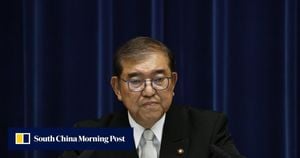Church of England Faces Pressure Over Abuse Scandal After Archbishop Quits
Justin Welby, who has led the Church of England for over 12 years as the Archbishop of Canterbury, announced his resignation earlier this week. His departure came after intense scrutiny over his failure to adequately address allegations of sexual abuse within the church. Many clergy members within the Church of England accuse Welby of not acting decisively enough to confront and manage such grave matters.
Welby himself admitted, during the announcement of his resignation, to not having taken the necessary steps since the abuse allegations first surfaced back in 2013. He expressed regret over the Church's slow response and the need for it to evolve toward creating safer environments. His remarks highlight the church's longstanding struggle with allegations of abuse and the greater issue of accountability among its leadership.
His resignation is rooted deeply in the fallout from the case of John Smyth, a barrister who, prior to dying, had abused at least 115 children and young men during the 1970s and 1980s, largely at Christian summer camps. Following the release of a report detailing the church's failings to investigate these charges properly, Welby found himself cornered by public opinion and church officials alike. The report brought to light the extent of the failings and has since ignited calls for accountability throughout the church hierarchy.
Archbishop of York, Stephen Cottrell, has emphasized the need for accountability, indicating on BBC Radio, "We know some people pretty systematically covered this up, and those people do need to be brought to account." It is significant to note, though, Cottrell was careful to distinguish who should take responsibility, clarifying he was not directly referring to bishops.
Throughout the Church of England’s extensive organizational structure, there are thousands involved, making the task of safeguarding complex and challenging. Cottrell underscored this complication by stating, "The church is a very, very large organization... safeguarding such an organization is a challenge," showing the fine line they must walk between accessibility and security.
Further complicacy arises from the Bishop of Lincoln, Stephen Conway, who also faced waves of criticism after being briefed about Smyth's allegations back in 2013. An unnamed victim of Smyth stated through the BBC, "Conway did not do enough when I informed him of the abuse." Conway later published an apology, admitting he may not have pushed hard enough for clarity with Lambeth Palace, Welby’s office.
Conway has asserted his belief of having acted within the bounds of his authority, but the revelations from the review insisting he was misled about the police referral of the abuse case to the authorities painted him and Welby as having mismanaged their roles during this notorious chapter. He stated, "It was my understaning logistics-wise the matter was reported to the police and duly passed on.”
Commenting on Welby’s handling of the abuse allegations, Cottrell mentioned there have been substantial advancements made under his leadership for safeguarding within the church, but cautioned on this specific case, he may have relied too heavily on advice from others without acting decisively.
Welby has consistently sought to unify the global Anglican Communion even as struggles exist among its members, especially when contentious issues arise surrounding rights for marginalized groups. This was especially evident when he clashed with Uganda's Anglican Church head, Archbishop Stephen Kaziimba, who was rebuked by Welby for endorsing Uganda's controversial anti-homosexuality laws. Kaziimba now points to Welby's resignation as proof of his failure to hold the church accountable and unify it again.
Indeed, this resignation sheds light not just on the inner workings of church governance but also on broader societal issues surrounding abuse and accountability. It’s become evident the need for thorough investigations and transparency within institutions is not merely for public image but is devoid of humanity and justice. For many, this scandal reflects deeply held fears about trust within the church system and how it reconciles the darkness of its past with aspirations for future integrity and safety.



